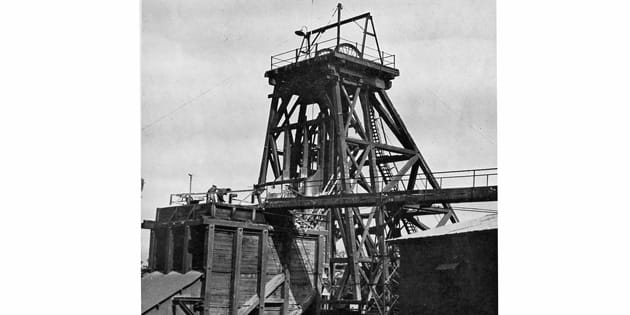Just in Time

The main shaft of the Globe & Phoenix Mine, Que Que. The richest gold mine in Southern Rhodesia
Just In Time
Aaron Menashe’s father, Abraham, was a hardened trader on the island of Rhodes in the Aegean Sea. Every day, at the break of dawn, he would set out with his donkey bearing a sack of wares on each side. With a rope wrapped round his waist and a fez as a head cover he would walk out of the walls of the Crusaders’ Castle and off to the villages around, returning late in the evening. He supported the family of two sons and two daughters as well as the widow of his oldest son, Isaac, and their four boys.
Abraham owned three properties within the Walls of the Crusaders Castle afforded him by gold dealing between the island and the Turkish Mainland. His son Aaron assisted him in this business: no questions asked.
Just in Time
Aaron decided to strike out for the United States of America on his own, but shoe shining in Portland, Oregon, did not agree with the seventeen year old, or perhaps it was the weather. His lungs collapsed. He took the fastest boat back home at the end of WWI where he was laid up for quite a while.
When he regained his strength back he proposed to Sarina Almilech, a shoemaker’s daughter on the island of Halki. Her father was a gambler to boot. The family was poor. Her mother had died before she became a teenager. Her older sister Rachelle controlled the meager funds. Rachelle found a job as a housekeeper with an Italian engineer in Alexandria. Sarina and sister Esther went with Rachelle as maids.
Sarina learned quickly how to bake and sew and was a hard worker. She was a good catch for Aaron.
With seven gold sovereigns in his pocket and just a smattering of Yankee expressions to communicate, the newly weds left by boat to Beira in Portuguese East Africa and then rail for Southern Rhodesia, which was taking immigrants without passports in 1919.
Esther had preceded her, married to Marco Alhadeff a respected leader of the Sephardi Jewish Community in Salisbury. They would provide all the introductions they would need.
Unfortunately severe drought hit the country soon after Aaron and Serina’s arrival. Record torrential rains followed. Maize, the staple crop of the country making up eighty three percent of agricultural income, took a beating, averaging less than seven bags to the acre. Unemployment rose. The warning went out to immigrants: proof of adequate capital or definite employment would be necessary for entry. Aaron and Sarina had arrived just in time.
The trading business was very competitive. Dainty night dresses were selling for less than ten shillings, corsets just a little more. Profit margins were small. The gold sovereigns were running out.
But the mining industry was thriving. Aaron decided Que Que was the place to be. The tiny village was an appendage to the largest and richest gold mine in the country, the Globe and Phoenix. In addition, two hundred and ninety three small claims had been pegged in the vicinity. Surely there was a fortune to be made there one way or another?
